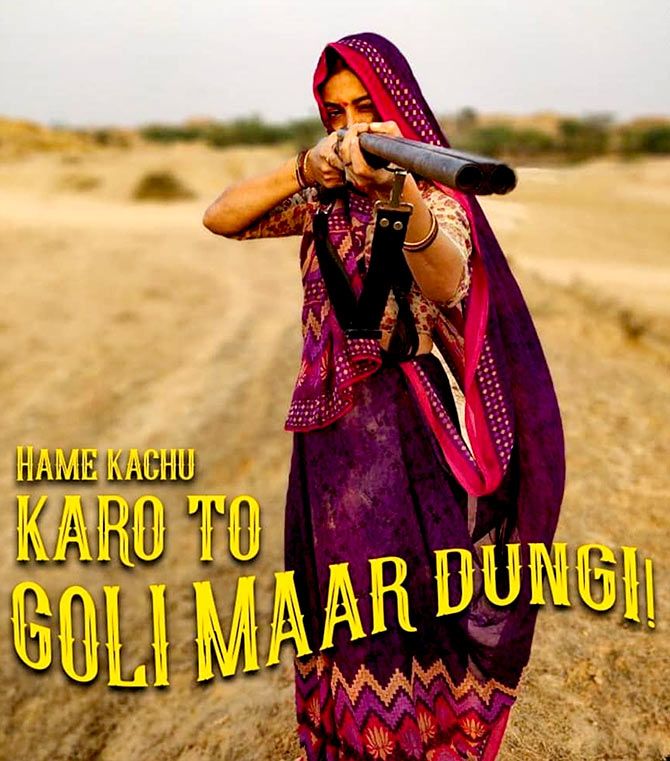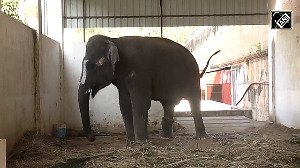'Sushant was our first choice for Lakhna.'
'Apart from looking desi, I wanted an actor who had a lot of physical energy.'
'Sushant came on board very quickly because he really liked the story.'

"If you talk about a dacoit film in India, nobody will forget Sholay," says Abhishek Chaubey as he gets ready with his new directorial venture Sonchiriya.
A film about bandits, it stars Sushant Singh Rajput, Bhumi Pednekar, Manoj Bajpayee, Ranvir Shorey and Ashutosh Rana.
Abhishek, who has directed Ishqiya, Dedh Ishqiya and Udta Punjab, says Shekhar Kapur's Bandit Queen influenced him while making Sonchiriya.
"My film does not explore why somebody became a bandit; it explores the reason why they stayed bandits," Abhishek tells Rediff.com Contributor Ramesh S.
It has been reported that while making Sonchiriya, films like Bandit Queen were at the back of your mind.
Bandit Queen is only the world, which is set in Chambal and talks about bandits.
The similarity ends there because not only Bandit Queen, but other bandit films like Paan Singh Tomar, primarily talk about two things -- either how somebody became a bandit or how the bandits were caught.
Bandit Queen and Paan Singh Tomar are essentially biopics about real people and their actions in life.
My film is a fresh take on bandits; it's about the gang, how they lived and what they believed in. Also, how these beliefs are put to question because of the events in the film.
My film does not explore why somebody became a bandit; it explores the reason why they stayed bandits.
Something happened in your life, you took revenge and became a bandit. But what makes you continue living that life?
Gangsters lead a very comfortable life; these people have a very hard life.
They have to walk 40, 50 km every day and don't know where the next meal will come from.
There is no personal life.
So what motivates them to continue living this life?
That's when we realised that they have a certain set of beliefs. They believe they are doing the right thing, that they are not criminals, but are warrior rebels.
A police officer told me that in the 1970s, there were more than a thousand bandit gangs operating in the Chambal area.
While some were corrupt with evil minds and bad reputations, there were other gangs as well who had good and respectable reputations.
These gangs often give back to society, treat women and children with respect, and believe that they are here to fulfill a higher purpose.
These are the people that interested me because from our urban lens, they are criminals. But if we remove those lenses and see it from their perspective, you will see a different picture.

What was the motive behind making this movie?
It started with a conversation I had with Ronnie Screwvala when I was still busy with Udta Punjab.
Then, we decided to do a film together.
We were thinking about what to do and he suggested an Indo-Western type of action film.
I said yes, and that started our journey.
Sudeep Sharma, my co-writer, and I started looking for subjects and that led us to the Chambal. We started reading about the bandit culture, the history of bandits, read some books and met a lot of people in the Chambal.
We were absolutely fascinated with their lives and the stories.
It turned out to be far more interesting than I thought it would be.
Then, we started writing Sonchiriya.
We travelled to the Chambal and started researching with local journalists. That led us to meet a lot of people who had an association with the bandits.
We also met some police officers who spent their entire life fighting and arresting them, as well as villagers who experienced that life.
Did you meet any real life dacoits?
Yes, we met some dacoits, who have now retired. They surrendered to the police, spent time in jail and have come back to live their lives peacefully.
We also had interactions with people, who were informers for them, who would cook for them. Some of them were part of my unit.

There was speculation that Ranbir Kapoor was initially considered for the film. Is that true?
Not really. When we started discussing whom to cast, some 10, 15 names came out, but Sushant (Singh Rajput) was our first choice for the role of Lakhna.
He lived in Delhi and now, Mumbai, for so many years.
He is very urbane, sophisticated and educated, but there is something desi about him.
If you look at the characters we have created, they are basically farmers who become bandits.
It was very important to get that desipan.
Apart from looking desi, I also wanted an actor who had a lot of physical energy. There's a lot of running and jumping around, physical action, firing guns, etc. So we needed an actor who would do that and was willing to go through the rigorous training and workshops that we did.
Sushant came on board very quickly because he really liked the story.
Bhumi (Pednekar) is a Mumbai girl, but again, there's something very Indian about her. She plays a rural woman who faces an extraordinary situation and becomes a person that she is in the film.
Bhumi came on board immediately after the narration as well, but she took about two to three months of prepping for the film.
For such a big cast, I had never had an easier casting process because everybody said yes on the first meeting purely on the basis of content.

Wasn't Manoj Bajpayee trying to avoid a bandit film since he starred in Bandit Queen and did not want to repeat the act again? Was it tough to cast him?
Not really. He did not have any issue when he read the script.
He is in a very different position in life now, where he is getting a variety of roles. So I believe he was looking for something like this.
Manojji's character is the soul of the film, and so I wanted him badly.
While I had to work hard for Sushant and Bhumi, with Manojji or even with Ashutoshji (Rana), I had no such worries because they got into their characters very quickly.
What can we expect from Sonchiriya?
As a film-maker, I think it's very important to entertain people. At the same time, the film must talk about important things.
This is an entertaining and thrilling film, with edge-of-the-seat kind of entertainment.
At the same time, the issues we talk about here are as relevant today as they were 45 years ago.
Caste and gender issues are very important issues today as well. Now because of social media, there is even more conversation around it.
When I make a film, it addresses these issues and even raises questions about it.

Which is your favourite film on dacoits?
Sholay is a benchmark of how to make an Indo-Western kind of dacoit movie.
Though it was deeply inspired by an American Western film, it successfully managed to give an Indian take on it.
Even today, it is one of the most engaging and thrilling movies ever made on dacoits.
Mera Gaon Mera Desh is also a favourite. It is the prequel to Sholay.
Films like Ganga Jamuna and Mother India are quite fascinating.
I believe dacoit culture is a part of our society, which is still happening right in the centre of our country. I don't think we have made enough films based on that.
Sunil Duttsaab starred in many dacoit films.
Yes. In fact, I have shot on the same location as one of his films in 1970.
A lot of old people in that village told us, 'Sunil Dutt aaya tha.' (Laughs.)

What are you working on next?
I am doing a Web series which is being produced by Junglee Pictures.
What is your take on #MeToo movement?
It is deeply sad and shocking that such incidents are taking place in the film industry. I believe many men in the industry must have realised the extent of crimes happening to their own fellow workers.
There has been a case or two where the allegations on a particular individual were false and they were made by malicious intentions.
But we have to understand that 90, 95 per cent cases are genuine; these charges are real.
So it is like a culture of exploitation and sexual harassment in this industry. It needs to change and we need to get justice for all the women who have showed courage to come out in the open.
The men in the industry should be scared now and should not indulge in such behaviour.













 © 2025
© 2025